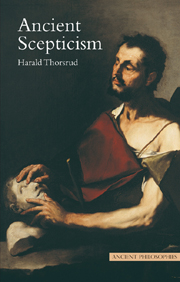Arcesilaus initiated a sceptical phase in the Academy after taking over in c. 268 BCE. He was motivated in part by an innovative reading of Plato’s dialogues. Where his predecessors found positive doctrines to be systematically developed, he found a dialectical method of arguing and the sceptical view that nothing can be known (akatalêpsia, De Or. 3.67, see DL 4.28, 4.32). He also advanced this conclusion in opposition to the ambitious system of the Stoics, claiming further that the appropriate response to the pervasive uncertainty generated by his method is the suspension of judgement (epochê).
Arcesilaus' dialectical method was practiced without significant modification in the Academy until Carneades, who became head sometime before 155 BCE. Carneades both continued and strengthened Arcesilaus' method (ND 1.11, Acad. 2.16, see also Acad. 1.46, and Eusebius, Praep. evang. 14.7.15). Sextus marks the change by referring to Plato’s Academy as Old, Arcesilaus' as Middle, and Carneades' as New (PH 1.220).
Since the main interpretative issues regarding both Arcesilaus and Carneades depend on the concepts of akatalêpsia and epochê, we must try to determine what they mean, how they are related, and what attitude the Academics take towards them – i.e. in what sense, if any, are these their sceptical doctrines?
